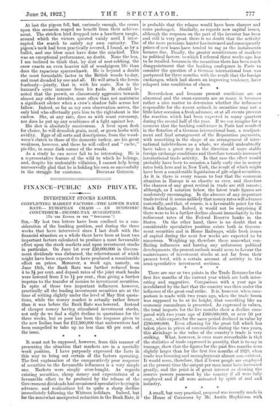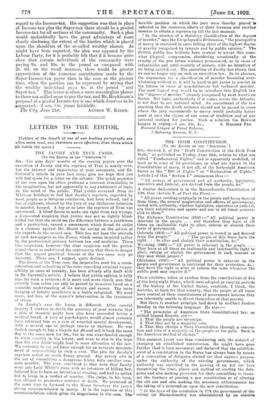FINANCE—PUBLIC AND PRIVATE.
INVESTMENT STOCKS EASIER.
CONFLICTING MARKET FACTORS—THE LOWER BANK RATE— EUROPEAN CHAOS — AN ECONOMIC CONUNDRUM—INCOME-TAX SUGGESTION.
(To THE EDITOR Or THE " SPECTATOR."] SIR,—My last two letters have been confined to a con- sideration of the banking position, and during the three weeks that have intervened since I last dealt with the financial situation as a whole there have been at least two important factors calculated to produce a most favourable effect upon the stock markets and upon investment stocks in particular. On June 1st over £50,000,000 in Govern- ment dividends was disbursed, the reinvestment of which might have been expected to have produced a considerable effect on prices. Moreover, a week ago, namely, on June 15th, the Bank Rate was further reduced from 4 to 31 per cent. and deposit rates of the joint stock banks were lowered from 2 to 1i per cent., thus giving a further impetus to the transfer of monies to investment securities. In spite of those two important influences, however, practically all the leading investment securities are at the time of writing slightly under the level of May 31st quota- tions, while the money market is actually rather firmer than it was before the Bank Rate was lowered. Instead of cheaper money having stimulated investment stocks, not only do we find a slight decline in quotations for the three weeks, but so poor has been the response given to the new Indian loan for £12,500,000 that underwriters had been compelled to take up no less than 63 per cent. of the issue. * * It must not be supposed, however, from this manner of presenting the situation that markets are in a specially weak position. I have purposely expressed the facts in this way to bring out certain of the factors operating. The first explanation of the comparatively poor response of securities to the favourable influences is a very simple one. Markets were simply over-bought. As regards existing securities, cheap money and expectations of a favourable effect to be produced by the release of the Government dividends had occasioned speculative buying in advance, and realizations led to quite a sharp decline immediately following the Whitsun holidays. Indeed, but for the somewhat unexpected reduction in the Bank Rate, it is probable that the relapse would have been sharper and more prolonged. Similarly, as regards new capital issues, although the response on the part of the investor has been and still is very great, there is no doubt that the activity of the mere premium hunter has increased and consequently prices of new loans have tended to sag as the instalments became due. Finally, the greater sensitiveness of markets to political factors, to which I referred three weeks ago, has to be recalled, because in the meantime there has been much disappointment that the banking confetence in Paris to consider the question of a German international loan was postponed for three months, with the result that the foreign exchanges, which had shown an improving tendency, have relapsed into conditions of chaos. * * Nevertheless, and because present conditions arc so abnormal and the cross-currents are so many, it becomes rather a nice matter to determine whether the influences responsible for the recent setback in securities may not a little later occasion a fresh advance, or at all events prevent the reaction which had been expected in many quarters during the second half of the year. If we can imagine for a moment that the banking conference in Paris had resulted in the flotation of a German international loan, a readjust- ment and final arrangement of the Reparation payments, with something in the shape of an arrangement of inter- national indebtedness as a whole, we should undoubtedly have taken a great step in the direction of more stable foreign exchange conditions and therefore towards increased international trade activity. In that case the effect would probably have been to occasion a fairly early rise in money rates both here and in New York, the result of which might have been a considerable liquidation of gilt-edged securities. As it is, there is every reason to fear that the economic situation in Europe is as chaotic as ever, and therefore the chances of any great revival in trade are still remote; although, as I mention below, the latest trade figures are moderately encouraging. In the absence of any important trade revival it seems unlikely that money rates will advance materially, and that, of course, is a favourable point for the Stock Exchange. Indeed, it would not be surprising if there were to be a further decline almost immediately in the rediscount rates of the Federal Reserve banks in the States. On the other hand, there is no doubt that a considerable speculative position exists both in Govern- ment securities and in Home Railways, while fresh issues of capital during the next few weeks are expected to be numerous. Weighing up, therefore, these somewhat con- flicting influences, and barring any unforeseen political developments, the present outlook would seem to favour the maintenance of investment stocks at not far from their present level, with a certain amount of activity in the semi-speculative investment sections. * There are one or two points in the Trade Returns for the first five months of the current year which are both inter- esting and suggestive. Comparison with a year ago is invalidated by the fact that the country was then under the influence of the great coal strike. It is, however, when com- parison is made with two years ago, when the trade boom was supposed to be at its height, that something like an economic conundrum is presented. As expressed in values, the total imports for the five months show a decline com- pared with two years ago of £460,000,000, or over 50 per cent., while exports for the same period declined in value by £290,000,000. Even allowing for the great fall which has taken place in prices of commodities during the two years, this shrinkage in the value of the country's trade is very striking. What, however, is even more remarkable is that the statistics of trade expressed in quantity, that is to say in tonnage, show that the figures for the past five months were slightly larger than for the first five months of 1920, when trade was booming and unemployment almost non-existent. It would seem, therefore, that if fewer people are employed at the present time the output per man must have increased greatly, and the point is of great interest as showing the reserve powers possessed by the country if all were fully employed and if all were animated by spirit of zeal and industry. * * * A small, but very practical, proposal was recently made in the House of Commons by Mr. Austin Hopkinson with regard to the Income,tax. His suggestion was that in place of Income-tax plus the Supertax there should be a graded Income-tax for all sections of the community. Such a plan would undoubtedly have the great advantage of more clearly disclosing the extent of the burden which is placed upon the shoulders of the so-called wealthy classes. As might have been expected, the idea was opposed by the Labour Party, for it is probably felt that if it became quite clear that certain individuals of the community were paying 9s. and 10s. in the pound as compared with 2s. 6d. on the small incomes, there would be greater appreciation of the immense contribution made by the Super-Income-tax payer than is the case at the present time, when the position can be expressed by saying that the wealthy individual pays 6s. in the pound and Super-tax." This latter is often a mere meaningless phrase to those not callled upon to pay the tax, and. Mr. Hopkinson's proposal of a graded Income-tax is one which deserves to be supported.—I am, Sir, yours faithfully,



































 Previous page
Previous page